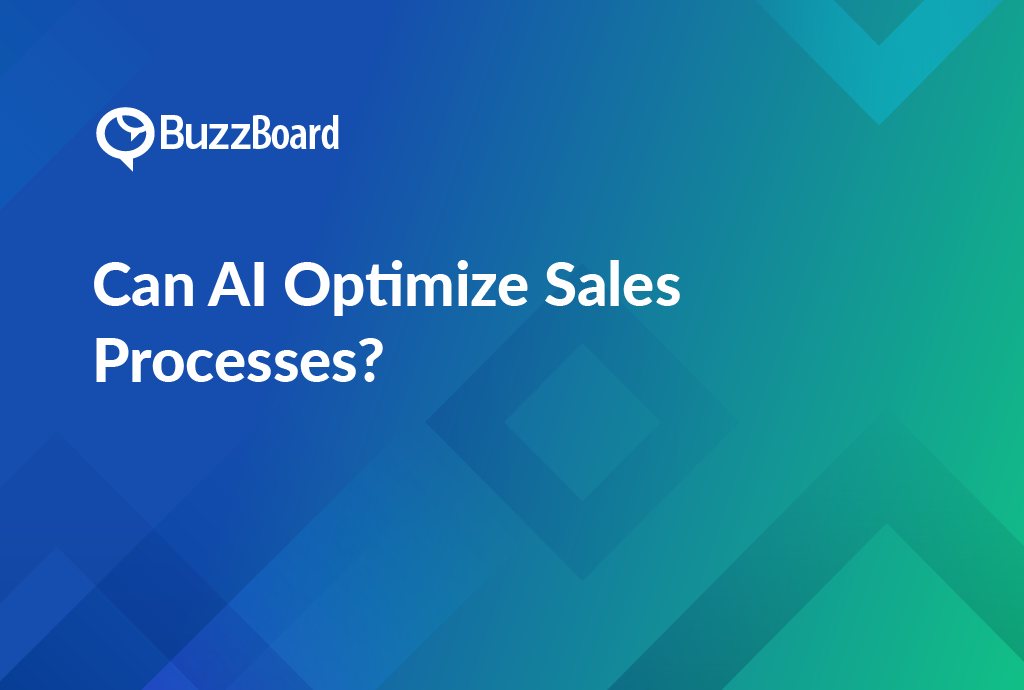Can AI Optimize Sales Processes? Yes, AI can significantly optimize sales processes by automating repetitive tasks, analyzing customer data, and providing personalized recommendations. By leveraging machine learning algorithms, AI can help sales teams identify new opportunities, streamline their workflow, and improve conversion rates. In this article, we’ll explore the benefits and potential applications of AI in sales process optimization, and how it can revolutionize the way sales teams work.
AI and Your Sales Process
The integration of artificial intelligence (AI) in sales processes has the potential to revolutionize the way businesses approach sales and customer engagement. By leveraging AI-powered tools, sales teams can streamline their workflow, enhance customer interactions, and ultimately drive revenue growth.
One of the primary ways AI can improve sales processes is through lead generation and qualification. AI-powered chatbots can engage with potential customers, identify their needs, and qualify leads based on their responses. This enables sales teams to focus on high-quality leads, reducing the time and resources spent on unqualified prospects.
AI can also help sales teams personalize their approach to each customer. By analyzing customer data and behavior, AI can provide insights on customer preferences, pain points, and buying habits. This information can be used to tailor sales pitches, improve customer service, and increase customer satisfaction.
AI can also automate routine and repetitive tasks, freeing up sales teams to focus on high-value activities such as relationship-building and strategic planning. AI-powered tools can handle tasks such as data entry, lead tracking, and follow-up communications, allowing sales teams to focus on more strategic initiatives.
Furthermore, AI-powered analytics can provide real-time insights on sales performance, enabling sales teams to identify areas for improvement and optimize their strategies. This data-driven approach can help sales teams make data-informed decisions, improve their sales techniques, and ultimately drive revenue growth.
By integrating AI into their sales processes, businesses can improve efficiency, enhance customer engagement, and drive revenue growth. As AI continues to evolve, it is likely to play an increasingly important role in shaping the future of sales and customer engagement.
Optimizing Sales Processes with Generative AI
The sales process is a crucial aspect of any business, and optimizing it can lead to significant improvements in revenue, customer satisfaction, and overall efficiency. Generative AI, a subset of artificial intelligence that generates new, original content, can play a vital role in streamlining the sales process. Here are some ways generative AI can help optimize the sales process:
- Personalized Sales Outreach: Generative AI can help create personalized sales outreach messages, emails, and phone calls that are tailored to each customer’s specific needs and interests. This can lead to higher response rates and conversion rates.
For example, a sales team can use generative AI to create customized emails that address specific pain points or concerns of potential customers. The AI can analyze customer data and generate a personalized message that resonates with the customer’s needs.
- Predictive Lead Scoring: Generative AI can analyze large datasets to predict which leads are most likely to convert. This can help sales teams focus on the most promising leads, reducing the time and resources spent on unqualified leads.
For instance, a sales team can use generative AI to analyze customer behavior, purchase history, and other data points to predict which leads are most likely to convert. This can help the sales team prioritize their efforts and allocate resources more effectively.
- Automated Sales Forecasting: Generative AI can analyze historical sales data and market trends to forecast future sales performance. This can help sales teams make informed decisions about resource allocation, budgeting, and strategic planning.
For example, a sales team can use generative AI to analyze historical sales data and forecast future sales performance. This can help the team identify areas for improvement, optimize their sales strategy, and make data-driven decisions.
- Content Generation: Generative AI can help create high-quality, engaging content that resonates with customers. This can include blog posts, social media posts, and other marketing materials.
For instance, a sales team can use generative AI to create high-quality blog posts that address common customer pain points. The AI can analyze customer data and generate content that is tailored to the customer’s needs and interests.
- Sales Enablement: Generative AI can help create customized sales enablement materials, such as sales scripts, presentations, and sales sheets. This can help sales teams stay up-to-date with the latest product information and customer needs.
For example, a sales team can use generative AI to create customized sales scripts that address specific customer pain points. The AI can analyze customer data and generate a script that is tailored to the customer’s needs and interests.
- Sales Analytics: Generative AI can help analyze large datasets to identify trends, patterns, and correlations that can inform sales strategy. This can help sales teams optimize their sales process and make data-driven decisions.
For instance, a sales team can use generative AI to analyze customer data and identify trends and patterns that can inform sales strategy. This can help the team optimize their sales process, improve customer engagement, and increase revenue.
In conclusion, generative AI has the potential to revolutionize the sales process by providing personalized sales outreach, predictive lead scoring, automated sales forecasting, content generation, sales enablement, and sales analytics. By leveraging these capabilities, sales teams can optimize their sales process, improve customer engagement, and drive revenue growth.
Optimizing with Predictive Analytics
Predictive analytics has revolutionized the sales landscape by enabling organizations to make data-driven decisions, optimize their sales strategies, and drive more revenue. By leveraging advanced statistical models and machine learning algorithms, predictive analytics can help sales teams identify high-value prospects, anticipate customer behavior, and optimize their sales processes to deliver more results, faster.
One of the primary benefits of predictive analytics in sales is its ability to identify high-value prospects. By analyzing customer data, such as purchase history, demographics, and behavior, predictive models can pinpoint the most likely buyers and prioritize sales efforts accordingly. This allows sales teams to focus on the most promising leads, increasing the chances of closing deals and driving revenue.
Predictive analytics can also help sales teams anticipate customer behavior, enabling them to proactively address customer needs and concerns. By analyzing customer data and behavior patterns, predictive models can predict when customers are likely to churn, cancel, or upgrade their services. This allows sales teams to proactively engage with customers, address their concerns, and retain valuable relationships.
Another key benefit of predictive analytics in sales is its ability to optimize sales processes. By analyzing sales data, predictive models can identify bottlenecks, inefficiencies, and areas for improvement in the sales process. This enables sales teams to streamline their processes, eliminate unnecessary steps, and focus on high-impact activities that drive revenue.
Predictive analytics can also help sales teams optimize their sales strategies by identifying the most effective channels, messaging, and tactics. By analyzing customer data and behavior patterns, predictive models can pinpoint the most effective ways to engage with customers, increasing the chances of closing deals and driving revenue.
In addition to these benefits, predictive analytics can also help sales teams improve their forecasting and pipeline management. By analyzing sales data and pipeline metrics, predictive models can predict the likelihood of closing deals, enabling sales teams to adjust their strategies and resources accordingly. This allows sales teams to optimize their pipeline, prioritize high-value opportunities, and drive more revenue.
Furthermore, predictive analytics can help sales teams improve their sales performance by identifying areas for improvement and providing personalized coaching and training. By analyzing sales data and behavior patterns, predictive models can identify areas where sales teams need improvement, providing targeted coaching and training to help them close more deals and drive revenue.
In conclusion, predictive analytics has the potential to revolutionize the sales landscape by enabling organizations to make data-driven decisions, optimize their sales strategies, and drive more revenue. By leveraging advanced statistical models and machine learning algorithms, predictive analytics can help sales teams identify high-value prospects, anticipate customer behavior, and optimize their sales processes to deliver more results, faster. Whether it’s identifying high-value prospects, anticipating customer behavior, optimizing sales processes, or improving sales performance, predictive analytics can help sales teams achieve their goals and drive more revenue.
Here are some actionable steps that sales teams can take to leverage predictive analytics and improve their sales processes:
- Identify high-value prospects: Use predictive analytics to identify high-value prospects and prioritize sales efforts accordingly.
- Anticipate customer behavior: Use predictive analytics to anticipate customer behavior, enabling sales teams to proactively address customer needs and concerns.
- Optimize sales processes: Use predictive analytics to identify bottlenecks, inefficiencies, and areas for improvement in the sales process.
- Optimize sales strategies: Use predictive analytics to identify the most effective channels, messaging, and tactics for engaging with customers.
- Improve forecasting and pipeline management: Use predictive analytics to predict the likelihood of closing deals, enabling sales teams to adjust their strategies and resources accordingly.
- Improve sales performance: Use predictive analytics to identify areas for improvement and provide personalized coaching and training to help sales teams close more deals and drive revenue.
By leveraging predictive analytics and taking these actionable steps, sales teams can improve their sales processes, drive more revenue, and achieve their goals faster.
Your Agency, Your Sales Process, Artificial Intelligence
Digital marketing agencies are increasingly leveraging artificial intelligence (AI) to optimize their sales process, revolutionizing the way they connect with potential clients and close deals. By incorporating AI-powered tools and strategies, these agencies are able to streamline their sales process, improve conversion rates, and ultimately drive business growth.
One of the primary ways AI is being used to optimize the sales process is through chatbots and virtual assistants. These AI-powered tools enable agencies to provide 24/7 customer support, answering common questions and addressing concerns in real-time. This not only improves the overall customer experience but also allows sales teams to focus on higher-value tasks, such as building relationships and closing deals.
Another area where AI is making a significant impact is in lead scoring and qualification. By analyzing vast amounts of data, AI algorithms can identify and prioritize leads that are most likely to convert, allowing sales teams to focus their efforts on the most promising prospects. This data-driven approach enables agencies to optimize their sales strategy, targeting the most receptive audiences and increasing the chances of closing deals.
AI is also being used to personalize the sales experience, tailoring messaging and content to individual prospects based on their unique needs and interests. By analyzing customer behavior and preferences, AI-powered tools can create highly targeted and relevant marketing campaigns, increasing the likelihood of conversion.
In addition to these tactical applications, AI is also being used to optimize the sales process at a more strategic level. By analyzing sales data and identifying patterns and trends, AI algorithms can help agencies refine their sales strategy, identifying areas for improvement and optimizing the overall sales funnel.
One of the most significant benefits of using AI to optimize the sales process is the ability to scale. With AI-powered tools, agencies can manage a larger volume of leads and prospects, increasing their reach and impact without sacrificing quality. This allows agencies to expand their client base and increase revenue, while also improving the overall efficiency and effectiveness of their sales team.
Another key benefit of using AI to optimize the sales process is the ability to improve forecasting and pipeline management. By analyzing sales data and identifying trends and patterns, AI algorithms can help agencies predict future sales performance, enabling them to make data-driven decisions and optimize their sales strategy.
In conclusion, digital marketing agencies are leveraging AI to optimize their sales process, revolutionizing the way they connect with potential clients and close deals. By incorporating AI-powered tools and strategies, these agencies are able to streamline their sales process, improve conversion rates, and drive business growth. As AI continues to evolve and improve, it is likely that we will see even more innovative applications of this technology in the sales process, further transforming the way agencies operate and succeed.










